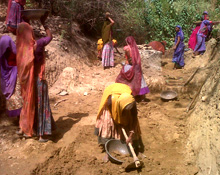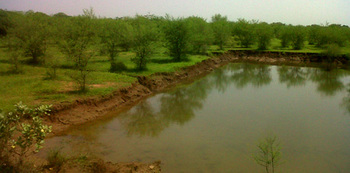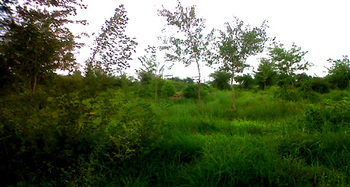Environmental Benefits of the Mahatma Gandhi National Rural Employment Guarantee Act (MGNREGA-EB)
Project description
Title: Environmental Benefits of the Mahatma Gandhi National Rural Employment Guarantee Act (MGNREGA-EB)
Commissioned by: German Federal Ministry for Economic Cooperation and Development (BMZ)
Country: India
Lead executing agency: Ministry of Rural Development (MoRD), Government of India
Overall term: 2013 to 2019

Context
The Mahatma Gandhi National Rural Employment Guarantee Act (MGNREGA) was enacted in 2005 and seeks to improve the rural infrastructure, augment land and water resources, and strengthen the livelihood resource base of the rural poor by providing at least one hundred days of guaranteed wage employment in a financial year to every household whose adult members are willing to do unskilled manual work. With a current annual budget of EUR 7.33 billion, MGNREGA includes 127 million households registered as beneficiaries, and provides wage employment to an average of 70 million households in a year.
The programme largely contributes to Natural Resource Management (NRM) by mandating 60 per cent of its total expenditure every year (approximately EUR 4.4 billion for 2018-19) on water harvesting and conservation, afforestation, plantation, land and soil development, and other NRM related works.
The bilateral project ‘Environmental Benefits of MGNREGA’ (MGNREGA-EB) is being implemented since 2013, and supports the Ministry of Rural Development (MoRD), Government of India and three states, namely Andhra Pradesh, Chhattisgarh and Rajasthan.
Moreover, the programme aims to enhance livelihood security of the rural households in India by providing at least one hundred days of guaranteed wage employment in a financial year to every household whose adult members are willing to do unskilled manual work.
Objective
Measures to enhance environmental benefits and rural livelihoods of the population through MGNREGA in the select pilot areas have been undertaken. The involvement of women in the planning and implementation phase of MGNREGA activities has increased.

Approach
The project works in the following areas:
- Developing the capacity of policy makers, project implementation staff, and the communities regarding natural resource management, and environmental benefits of MGNREGA.
- Enhancing access to information for all involved actors, regarding the potential environ-mental impacts of MGNREGA on enhancing water security, green cover and soil protection.
- Assisting gender-sensitive planning, designing, and implementation of MGNREGA activities.
- Establishing innovative models for holistic watershed and landscape based MGNREGA activities that can demonstrate tangible environmental benefits.
- Developing and institutionalising mechanisms for regular maintenance and management of the assets created under the MGNREGA.

Results
The following results have been achieved so far:
- The Government of India has scaled-up the innovative model developed by MGNREGA-EB project on remote-sensing assisted NRM planning for MGNREGA. At least 10,000 lo-cal Governments will prepare plans using this methodology by March 2019. Geographic Information System (GIS) assisted Integrated Natural Resource Management (INRM) planning for enabling self-governing local councils (Gram Panchayats) to take decisions about implementing activities that are part of the MGNREGA
- Afforestation of barren hillocks in highly drought affected areas in Andhra Pradesh has been enlarged to 10,150 hectares by the state government.
- Renewal of 124 cascade tanks covering the entire Champavati river basin is being undertaken in Andhra Pradesh
- Block plantations alongside the Mahanadi river in Chhattisgarh have contributed in preventing soil erosion, as well as providing livelihood to 134 women of 16 self-help groups (SHG) through provision of legal usufruct rights
- Other technical innovations including groundwater recharge wells, root zone water har-vesting systems, drainage line treatments and participatory irrigation management have been demonstrated in the three states.
- A Report on ‘Mapping Scope of MGNREGA on Sustainable Development Goals. (SDGs)’ was published, and the Ministry of Rural Development is currently being supported in re-porting achievements from MGNREGA on 13 SDGs and 27 targets
- Awareness generation activities have contributed to a 20 per cent increase in participation of women in the core project areas of MGNREGA. Special trainings are available for women (worksite supervisors), and women are included with priority in the asset man-agement user groups created under the MGNREGA-EB project
- Through the course of implementation, the project has developed robust partnerships with the MoRD, state governments, and a host of non-governmental organisations specialised in providing technical, research and knowledge support.